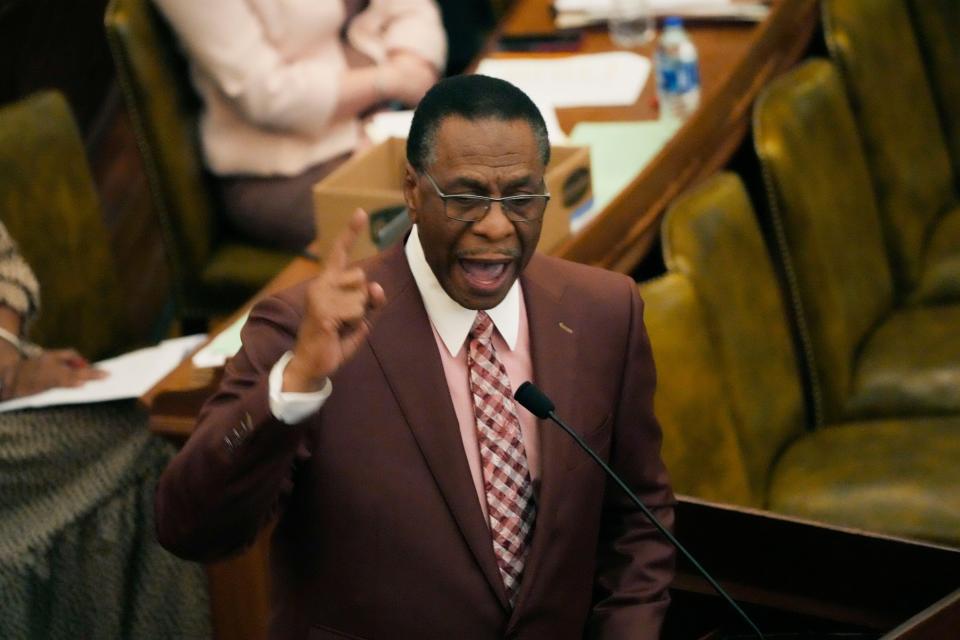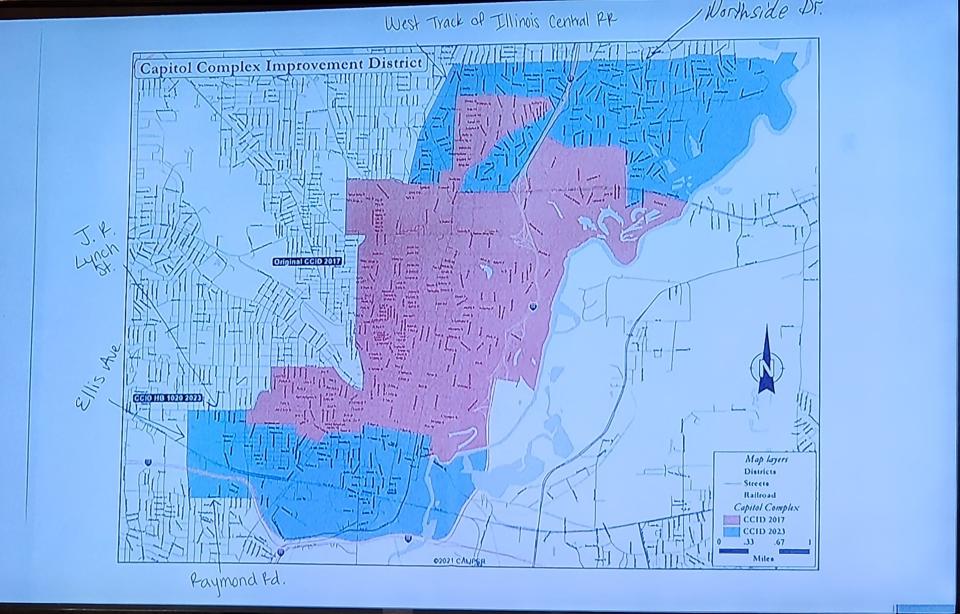Mississippi House passes controversial House Bill 1020, sends to Gov. as session nears end
- Oops!Something went wrong.Please try again later.
- Oops!Something went wrong.Please try again later.
- Oops!Something went wrong.Please try again later.
House Bill 1020, which would significantly increase state control over Jackson's judicial system and policing, passed the Mississippi House, 72-41, on Friday, sending one of the most controversial bills of the 2023 session to the governor's desk as lawmakers wind down their work for the year.
Democratic leadership promised the bill, if it is signed into law by Gov. Tate Reeves, will see legal challenges immediately upon taking effect on July 1.
"Legal action takes place when there is a cause of action. Cause of action does not become effective until the law actually is enacted. As soon as this bill becomes law, there will be lawsuits filed," House Minority Leader Robert Johnson, D-Natchez, said.
It would create a new unelected court system within an expanded Capitol Complex Improvement District, add temporary appointed judges to the Hinds County court system, increase the boundaries of the CCID and allow Capitol Police to work outside of that area, expanding their jurisdiction to include the entire city, all of which local leaders have opposed.
More: Jackson officials speak out on reasons why HB 1020 is not right solution for city's courts

It would also provide state funding for new public defenders and assistant district attorneys, moves that many in Jackson have called for, but that does little to sway the view that they have on the overall bill.
Its passage comes as a major victory for members of the legislature's Republican supermajority, who have fought against accusations of racism and unconstitutionality from many of Jackson's residents and nearly all of its elected representatives. All but three Republicans voted for the bill, while no Democrats did. Rep. Shanda Yates, an independent who represents Northeast Jackson, also voted yes.
In the House on Friday, many of the same Democrats who spoke for nearly five hours against the bill earlier in the session rose again. One representative who did not speak during that debate chose to Friday. Rep. Alyce Clarke, D-Jackson, was the first Black woman to be elected to the Mississippi Legislature and announced her retirement earlier in session. With the session's end looming, some of her final words to the House were urging them to oppose HB 1020.
"Vote against this bill. Do the right thing. Do the Christian thing. Do as you would want somebody to do if it was your city," Clarke said. "This is probably the last time I'll be up here, but it's been a pleasure. It hasn't all been a pleasure, but most of it has been a pleasure. Have a good day."
The bill was first authored by Rep. Trey Lamar, R-Senatobia, and later altered significantly by Sen. Brice Wiggins, R-Pascagoula. Lamar lives about two and a half hours from Jackson, while the Wiggins lives about three hours away. Both have repeatedly said their intentions are to increase safety in the capital city, both for the sake of its residents and for all Mississippians who may want to visit.

That said, Democrats in the legislature and Jackson's local elected officials have stood sharply in opposition to a plan they say is being forced on a majority-Black city by a majority-white state government.
Rep. Christopher Bell, D-Jackson, said the bill would effectively create a city within a city.
"The next thing I see coming out of this legislation, 1020, if it passes, is that will they start now to next year introduce a city council for the capital city complex and a city manager for the capitol city complex? Is that next? Is it needed?" Bell said.
Johnson said the final version of the bill is "worse than it was last time we looked it at," then he also spent significant time speaking against it.
Johnson particularly spoke against an aspect of the bill that would allow the CCID inferior court, which would only try misdemeanors and preliminary aspects of felony cases, to send convicted individuals to prisons run by the Mississippi Department of Corrections. Municipal courts, which the CCID court has been compared to in scope, send those convicted of misdemeanors to local jails.
As the bill's opponents begin to consider legal challenges, Johnson said judges will see the issue in sending misdemeanor offenders to state prisons.
"Everybody has said 'lawsuit' a couple of times up here, and I have had a colleague of mine tell me, 'Well you know how conservative the fifth circuit court of appeals is, you'd be good if you got a ruling out of that,' but I'm going to tell you, there is nowhere in this country that there's a judge, I don't care how conservative he is, who thinks that a person who is convicted of a misdemeanor should go to prison," Johnson said. "This is what you stay here, the last day of the session, to send people to prison for a misdemeanor."
Johnson said that whether someone ends up in prison for a minor offense could be decided by racial biases within the judicial system, particularly since the judge hearing the case would not be elected.
"The reason it bothers me so much (is) because I know how selective jurors can be, jurists can be, and see I'm Black," Johnson said. "I know y'all can see that. And there's a jurist, there's a judge in this city, that may be appointed by a CCID court, that would look at me and say, 'Maybe you need a night in prison.'"
Previous versions of the bill would have expanded the CCID to include some of the most affluent neighborhoods in the city, in Northeast Jackson, but the final conference committee report changed those boundaries. The northern boundary sits at Northside Drive, rather than County Line Road. The area was also expanded to include lower-income areas south of Jackson State University. Wiggins said Thursday that those changes were made after listening to feedback from the community.

Rep. Edward Blackmon said even the new CCID boundaries would be far whiter than the city as a whole, and like many speaking against the bill he looked to future court challenges.
"This district's boundaries look awfully white. You have Fondren, Belhaven and Eastover in there. Now, what do those three areas mean here in Jackson. That's where whites live. You captured about 85% of the white population in that district. That will be important, somewhere in somebody's court when the facts are laid out," Blackmon said.
Johnson said his words were meant more for future courts than for House members.
"I know I didn't change any minds here today, but fifth circuit, do you hear me?" Johnson said.
An accompanying bill passed by the House later Friday clarified Capitol Police's role outside of the CCID. Capitol Police would have primary jurisdiction inside the district, which was created in 2017 to funnel sales tax dollars toward infrastructure projects in an area with a high number of state government buildings that pay no property tax. In the rest of the city, Capitol Police would have secondary jurisdiction, with the Jackson Police Department holding primary.
Another aspect from the accompanying bill would require the chief of Capitol Police — or commissioner of the Department of Public Safety which oversees Capitol Police — the JPD chief and the Hinds County Sheriff to hold regular public meetings at a location within the CCID where the public can ask questions of them.
Rep. Zakiya Summers, D-Jackson, said her white colleagues cannot understand the fear that Black parents have for their children interacting with police. She has three young sons, Marvin, Mavis and Mathis.
"I don't know if you really understand what police do to Black communities," Summers said. "When you go home from this body and lay in your bed at night, I want Marvin, Mavis and Mathis to be on your mind."
Summers also said that the bill defies traditional conservative principles like limited government and spending.
"This is about spending millions of dollars to create a police state," Summers said. "When we tell you that there are going to be negative racial consequences in terms of policy, why don't you believe us?"
After opponents had finished speaking, Lamar rose again to defend himself and his bill, fending off shouts from Democrats in the process. Lamar directly responded to a number of Democrats who said their words were meant for the historical record, with them having little to no hope of stopping the bill.
"You ain't the only ones trying to make a record, gentleman," Lamar said. "I get to make a record too, except my record is going to focus on the regular people of Jackson instead of the politicians that get in here and are more concerned about the politics of a number, one zero two zero, than doing the right thing for the people who live outside these walls."
Lamar grew visibly angry as he spoke about the criticisms that his bill is racist.
"And let me tell you what, gentleman, you talked about being offended, I'm offended as well," Lamar said. "And I have that right because my heart bleeds red just like yours. That's the only color that should matter in this building. If I have to stand here and listen to being called a racist because I'm trying to do the right thing, we're going to talk about the color that matters and that's the red that flows in my veins and yours alike. I'm going to refuse to take the race-laced, un-factual rhetoric as bait."
Lamar also said the legislature has invested in Jackson, countering criticism that they have not done so, and that the city cannot be trusted to improve its crime issues on its own.
"We're not going to turn over hundreds of millions of dollars to a city government over the last several years that's theme is this, no water, no sewer, no garbage collection, no attempt to collect the necessary fees that operate those systems," Lamar said. "No adequate police force because of failure to respect the police force of the administration, and the fire departments, and a failure of the Hinds County leadership to support its own courthouse and its jail."
When the bill first reached the House floor on Friday morning, House Democrats attempted to kill the bill by filing five points of order, four of which came from Johnson. It took attorneys and lawmakers about three hours to consider them, but each were ultimately not well taken, and the House reconvened for debate.
After about two hours of debate, it passed the House by nearly 30 votes. It had passed the Senate on Thursday by a vote of 31-15.
This article originally appeared on Mississippi Clarion Ledger: Mississippi Legislature passes controversial HB 1020 Jackson courts bill

